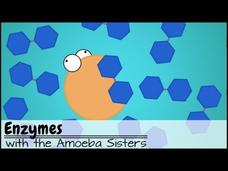Crash Course
Determining SN1, SN2, E1, and E2 Reactions: Crash Course Organic Chemistry
Organic chemistry isn’t that different from an adventure game, with substrates as characters, nucleophiles as magic potions, and reaction conditions as different magical kingdoms. In this episode of Crash Course Organic Chemistry, we’ll...
Crash Course
Substitution Reactions - SN1 and SN2 Mechanisms - Crash Course Organic Chemistry
We’ve already learned a bit about substitution reactions in organic chemistry and the two different paths they can follow: SN1 and SN2. In order to better predict the products of a substitution reaction and understand how they work, we...
Amoeba Sisters
Enzymes (Updated)
The Amoeba Sisters explain enzymes and how they interact with their substrates. Vocabulary covered includes active site, induced fit, coenzyme, and cofactor. Also the importance of ideal pH and temperatures for enzymes are discussed.
Curated Video
Factpack: Enzymes
How enzymes power the everyday chemical reactions our bodies rely on. Biology - Cells And DNA - Learning Points. A Twig FactPack Film. Open a discussion on what has been already learnt in a topic, or use to grab attention at the start of...
Curated Video
GCSE Biology - What are Enzymes?
In this video, we cover: - What enzymes are - How enzymes work - The difference between the lock and key model and the induced fit model Exam board specific info: AQA - Suitable for everyone IGCSE Edexcel - Suitable for everyone Edexcel...
Curated Video
Bearded Dragons! What, Where, How
What is a bearded dragon, Where does it come from, and How can we provide them proper care in captivity? Jessi and Bindi the bearded dragon explain.
Professor Dave Explains
Synthetic Biology and Materials Science Part 2: Nature-Made Plastics
In the previous tutorial we outlined the basics regarding synthetic biology as applied to materials science. We can engineer microorganisms that will produce virtually any compound we want, via a series of reactions that are catalyzed by...
Professor Dave Explains
Ritter Reaction
It's the Ritter reaction! Named after its inventor, John Ritter. No, not the actor from Three's Company. A different guy. This is a great way to go from an alcohol or alkene to an amine. How does it work? What are chemists doing with...
Catalyst University
Labeling Parts of a Reaction Coordinate Diagram
Labeling Parts of a Reaction Coordinate Diagram
FuseSchool
Enzymes
Enzymes are really important proteins, that speed up the rates of reactions such as in photosynthesis, respiration and protein synthesis. The enzymes and substrates are always moving, and occasionally they collide at the right speed and...
Amoeba Sisters
Enzymes (Updated)
Enzymes really know how to keep things moving along! Introduce these powerful proteins through a short video from an extensive life science playlist. Viewers learn why enzymes are specific in their jobs, important enzymes in our bodies,...
Teacher's Pet
Proteins and Enzymes
Life begins with enzymes and ends without enzymes. The video explains where to find proteins and enzymes. It details how they work and why they are crucial to life.
Bozeman Science
Enzymes
Hydrogen peroxide bubbles might look painful on a cut, but they are actually doing an important job. The video explores enzymes by allowing learners to see active sites on enzymes and how substrates, like a key fitting a lock, fit...
Ricochet Science
How Enzymes Work
Has your class ever wondered exactly what jump starts chemical reactions within the body? Pupils view a short video segment that animates a chemical reaction, complete with enzymes and substrates, so they may further understand this...
Amoeba Sisters
Enzymes and ... Pac-Man?
What did the enzyme tell her substrate? You complete me! An instructive video uses a great comparison of enzyme shape and function to the game Pac-Man. After explaining the concepts, the resource offers a real-world example...
Khan Academy
Khan Academy: Energy & Enzymes: Introduction to Enzymes
Learn about the function of enzymes in biological systems in this video. Video overviews active sites, substrates, induced fit, and activation energy. [8:12]
Bozeman Science
Bozeman Science: Ap Biology Lab 2 Enzyme Catalysis
Paul Andersen starts with a brief description of enzymes and substrates. He then explains how you can measure the rate of an enzyme mediated reaction. Catalase from yeast is used to break hydrogen peroxide down into water and oxygen. He...







